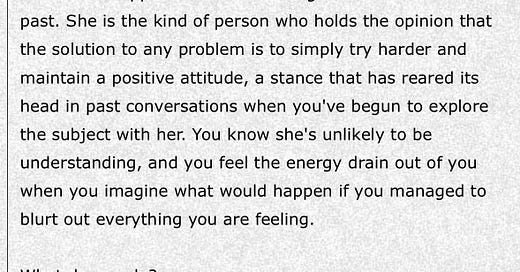Depression Quest
by Zoe Quinn
Released on the internet in 2013
It’s been a while. Walking pneumonia kicked my ass. I’m coming out of more than two weeks on the couch, sleeping most of the day, barely having energy even for the internet, let alone practicing or writing. I lost my momentum, and now I have to re-cultivate the creative discipline I worked so hard to foster and maintain since I ran out of gigs in October. My wheezing cough hasn’t entirely gone away. My guitars are gathering dust.
But I got a text last week from a music director I worked with last year asking if I wanted to play this spring’s high school musical. I told him yes, of course. The money’s not great, but the MD is a sweetheart, and the school is known to be a haven for queer kids in northern Delaware. So there’s some incentive to get me back to it.
Yesterday was my forty-second birthday. I talked to my family and learned my mother’s brain has sabotaged itself, and the question is not if but when her memories will disappear.
Over the course of my life I’ve grown conversant with the many permutations of despair and boredom and blankness. Living with bipolar II, I’ve learned the difference between depression, which I’ve largely medicated away, and a more environmental sadness, which is what I’m feeling now.
But I can still vouch for the accuracy of Depression Quest’s rendering of depression—more frustrated disinterest than despondency, an incapacitating self-doubt. I played (do we say play or read when talking about how we engage with interactive fiction?) it the day before my birthday. I was waiting at the dealership to get my car inspected, and on a whim decided I wanted to make a Twine game. Because why the fuck not?
So Depression Quest was research. I didn’t bother trying for the different endings—I rarely do with branching narrative games—but I still found pleasure in the story. Which is weird, maybe? What was that Nirvana lyric again? I miss the comfort in being sad. In our nightmare existence, it’s often hard to stop and do absolutely nothing, which our minds and hearts and bodies need more than we probably think.
If I’m remembering correctly (and doubtless reductively), lithium works by making neurotransmitters less efficient, slowing them down, chilling them the fuck out. And so the inertial anxiety permeating Depression Quest actually soothed me. Maybe it’s akin to how a lot of folks vibe out to horror movies. I don’t have a stomach for simulated violence, but I could take this. And I guess that’s just where I am at this phase of my life: irrefutably middle-aged, witnessing time fracture our bodies and loves and institutions. Jesus fucking Christ. Let’s see how much more I can take.



